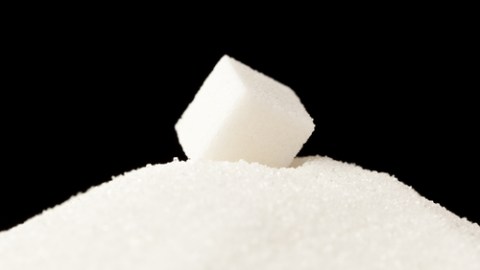The Great Sugar Conspiracy

Consider this scenario. Due to protectionist trade policies, you pay 41 percent more for sugar than the rest of the world, and yet you tend to consume it not as the kind of natural sugar that is found in breast milk, but in the form of processed sugars such as high-fructose corn syrup. You make a New Year’s resolution to eat healthier, but your choices as a consumer have already been co-opted. Of the 600,000 items in the U.S. food supply, 80 percent are laced with added sugar.
When you consume fructose, it stimulates the same reward centers in your brain as cocaine or heroin. It is true that humans evolved to reward ourselves for things that are necessary for survival, but this becomes a problem when your brain doesn’t register that you are full. So you keep drinking and eating more added sugar that is found in the processed foods and beverages that are so ubiquitous in the American diet. You gain more weight. You then turn to the services of the multibillion-dollar weight-loss and pharmaceutical industries.
Is this some far-flung conspiracy theory or an accurate diagnosis of the global pandemic of chronic disease?
What’s the Big Idea?
Most experts agree that excessively processed sugar is bad for you. Forty years ago, high-fructose corn syrup was introduced to the American diet. Obesity rates have since gone through the roof. No study has directly linked the two, but recent studies suggest that excess fructose “is being metabolized to produce fat, while glucose is largely being processed for energy or stored as a carbohydrate, called glycogen, in the liver and muscles.”
In other words, not all sugar is bad. Or is it?
According to the pediatric endocrinologist Robert Lustig, sugar should be considered toxic. Lustig laid out his argument in a 90-minute lecture that went viral on Youtube. It also attracted plenty of criticism. Let’s not toss out the the strawberries with the soda, responded David Katz, director of Yale’s Prevention Research Center. Others have criticized Lustig’s use of unreliable survey data to make his case that the overconsumption of sugar causes chronic metabolic disease.
And yet, Lustig is uncompromising in his war on sugar. Sugar is “a poison by itself,” he argued last February, and it should be regulated like alcohol and tobacco. Lustig is now out with a highly anticipated book called Fat Chance: Beating the Odds Against Sugar, Processed Food, Obesity, and Disease, which documents the science and the politics that has led to the pandemic of chronic disease over the last 30 years.
What’s the Significance?
Fat Chance promises to be one of the most talked about books of the year because of the charismatic Lustig’s skills as a communicator, and for the way he is able to frame the significance of this complex problem.
Lustig lays out the stakes of our obesity pandemic as follows:
There is real science behind our worldwide obesity catastrophe. And science should drive policy, but as you will see, the politics get in the way. This is the most complex issue facing the human race this side of the Middle East conflict. And it has become incrementally more complicated over time, with multitudes of stakeholders with set agendas, and bigger than the individual parties involved. Devoid of simple solutions, it has destroyed families and claimed the lives of countless people.
Follow Daniel Honan on Twitter @Daniel Honan




